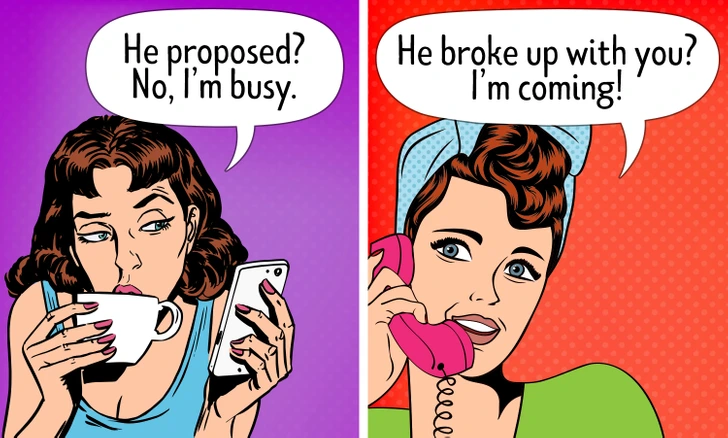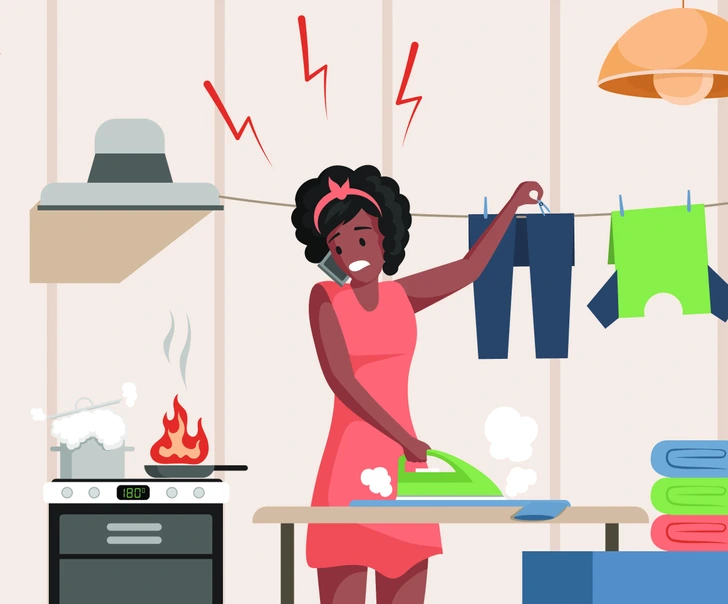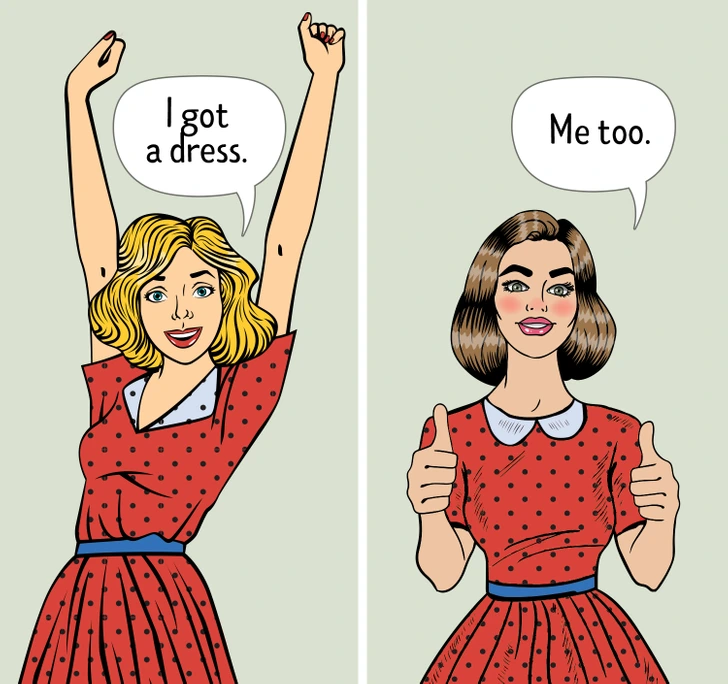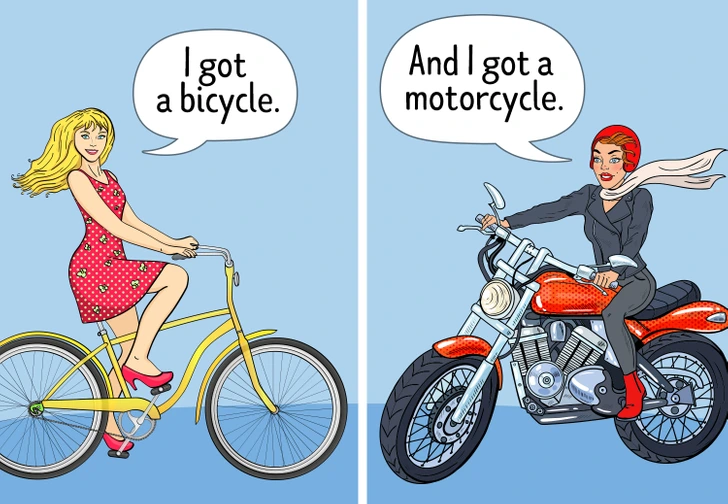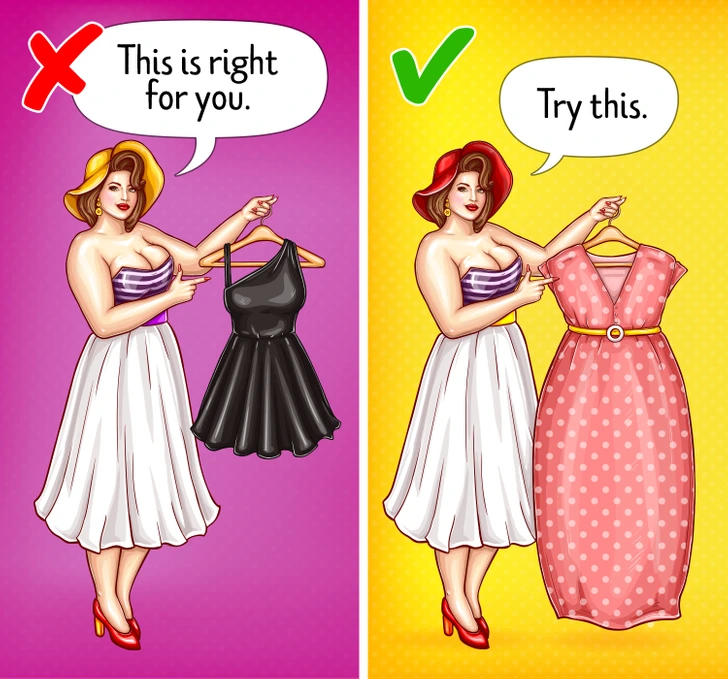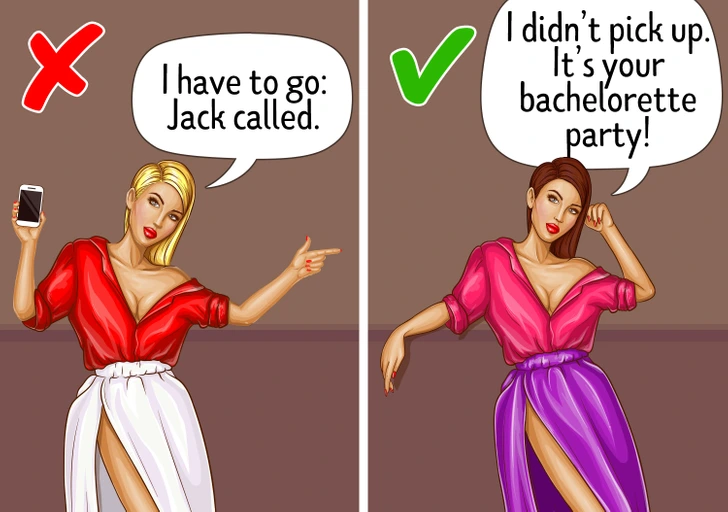13 Signs of a Toxic Friendship That’ll Do You More Harm Than Good
Long-term friendships are often seen as valuable, but not all of them stay healthy over time. Letting go of an old friend can be emotionally hard, but sometimes it’s the best decision for your mental health and emotional wellness.
As we grow, some friendships start to feel one-sided, draining, or even harmful. A toxic friendship can lower your self-esteem, increase your stress levels, and block your path to personal growth.
Our experts have listed key signs that may help you identify a toxic friend. If your friend shows even a few of these traits, it might be time to rethink your relationship and consider taking a break or moving on—for the sake of your emotional balance and inner peace.
1. She is not happy when you’re successful.
If you share your success with a toxic friend—like winning a competition, getting a promotion, or finding a loving boyfriend—and she quickly changes the topic to complain about her own life, it’s a big red flag. She might say things like, “You have everything, and I have nothing” or “You always win, I never will.”
This behavior shows she’s not happy for you—she’s secretly jealous. A real friend supports your wins, but a toxic friend can make you feel guilty for your success. Over time, this can hurt your self-esteem and create unnecessary emotional stress.
You may even try to help her—maybe by setting her up with someone or sharing tips to succeed—but she’ll likely reject your help and continue playing the victim. This kind of emotional manipulation is damaging and can hold you back from your own happiness and personal development.
2. She acts jealous as if she were your boyfriend.
If your friend gets upset because you met someone else before meeting her—or if she expects to be invited everywhere—you might be dealing with a controlling friend. In worse situations, she may even track your social media activity, watching who you hang out with and where you go, and then get angry when she’s not included.
This kind of behavior causes emotional pressure and creates social anxiety. Instead of enjoying your time with others, you’ll start feeling guilty or afraid of her reaction.
Over time, you may take on the role of a “teacher,” trying to explain to her that this isn’t healthy behavior. But mental health experts say this usually doesn’t help. Toxic friendships like this often lead to regular arguments, emotional exhaustion, and eventually, a broken relationship.
It’s important to set healthy boundaries and protect your emotional well-being before the damage becomes long-term.
3. You feel exhausted after talking to her.
Sometimes, you don’t even realize it—but after spending time with a certain friend, you feel drained, anxious, or even develop a headache. According to psychologist Susan Heitler, this happens because of psychosomatic symptoms—when emotional stress turns into physical pain. Our mind and body are deeply connected, and when someone causes emotional discomfort, it can affect our overall health.
If you often feel this way after talking to a specific friend, take it seriously. Keep track of how you feel after each conversation. If you notice a pattern, it could be a sign that this relationship is damaging your mental health and causing unnecessary emotional stress.
In such cases, it’s okay to take a break from toxic communication. Your peace of mind and emotional healing should always come first.
4. Sometimes you feel like you want to hide something from her.
Over time, your interests may change, or past negative experiences might make you feel uneasy. You may start to hold back your thoughts and avoid sharing personal things with your friend—even though you once told her everything. Sometimes, it’s not one big reason—just a feeling that something isn’t right.
This growing emotional distance is a clear warning sign. When you stop talking about your feelings, challenges, or life updates, the connection weakens. Soon, you’ll realize there’s nothing meaningful left to talk about.
A healthy friendship needs open communication and emotional support. If that’s missing, the relationship may be slowly reaching its end—causing both of you emotional burnout and disconnection.
Advertisement – Continue Reading Below
5. She calls you at any time of day asking you to listen to her.
Everyone needs support sometimes—but a toxic friend takes it too far. She might call you late at night, expecting you to listen to her problems for hours. If you say you’re tired or busy, she gets upset or guilt-trips you.
While emotional support is part of any close relationship, you’re not her therapist or a shoulder to cry on every day. Constant emotional dumping can lead to stress overload and mental fatigue.
If you keep giving in to her late-night calls and endless complaints, it sends the message that it’s okay. Soon, she’ll call more often, and her problems will take up more of your time—draining your energy and hurting your emotional well-being.
It’s important to set healthy boundaries so you can protect your mental health and avoid being emotionally used.
6. She highlights her advantages using your disadvantages.
She might seem bold, stylish, and full of confidence. She always wears trendy clothes and walks with attitude. But if she constantly criticizes others—including you—it’s a sign of something deeper. Most likely, she struggles with low self-esteem and hides it by acting superior.
This kind of toxic confidence is harmful. Being around her can make you feel less confident and unsure about yourself. Over time, you may start to doubt your own choices, appearance, or abilities.
Real confidence lifts others up. But when someone uses insults or constant judgment to feel better, it’s a form of emotional manipulation. Protect your self-worth and avoid letting her negativity affect your mental well-being.
7. She copies your behavior, haircut, nails, and even your boyfriend.
Sometimes a friend starts copying your style, behavior, or even your personality. She may not do it to harm you—she might just admire you deeply. She could imitate how you walk, talk, dress, or do your makeup. She may even copy your nail designs, share similar opinions, or start dating someone who reminds her of your boyfriend.
At first, this may seem flattering. But over time, it can feel like she’s trying to be you instead of being herself.
This usually means she lacks confidence or struggles with her own identity. She might see you as a source of inspiration because she finds it hard to create her own ideas or express her own style. While this behavior shows emotional dependency, it’s not always toxic—unless it starts to drain your energy or make you uncomfortable.
If you feel fine with her copying you, you can keep the friendship. But it’s important to protect your individuality and not let her affect your personal growth.
8. She’s too dramatic and only talks about her own problems.
Every conversation with her is filled with complaints, sadness, and negativity. She constantly talks about how hard her life is and seems to find comfort in her own pain. While it’s okay to share problems, some people become emotionally addicted to negativity.
Psychologists say that being overly sensitive, always offended, or seeing only the bad side of life can be signs of neurotic behavior or chronic emotional distress.
When you spend too much time trying to support her, you might start to absorb her negative mindset. You may find yourself avoiding happy topics just to avoid upsetting her—and slowly, you might also begin to focus only on what’s wrong in your life.
This creates mental exhaustion and can damage your own emotional health. It’s important to stay aware and protect your positive mindset before you fall into the same pattern.
9. She tries to be better than you at everything, making your friendship feel like a constant race.
When you happily share something—like a great deal on shoes—she quickly tries to one-up you. You might say, “These were only $20 on sale!” and she’ll reply, “Well, mine were $200, but yours are nice too.” No matter what, she always tries to have the better story, the better purchase, or the better experience.
This creates an unhealthy habit of constant comparison. Over time, the friendship feels more like a competition than a supportive relationship.
When one person always tries to win, it creates a silent message: “I’m better than you.” This makes it hard for either of you to feel truly equal or respected. Instead of building each other up, this behavior can lower your self-esteem and cause emotional tension.
Healthy friendships should be based on mutual support, not silent rivalries.
10. She uses you.
If your friend often asks for favors—like a ride, money, using your phone, or help with things like redecorating her apartment—but rarely offers anything in return, that’s a red flag. This kind of person often uses others for personal gain, without caring about their time, energy, or comfort.
This is a classic sign of emotional manipulation and toxic dependency. Over time, the more you say “yes,” the more she will come to expect your help, turning your kindness into her convenience.
To protect your emotional and financial boundaries, it’s important to learn to say no. A real friend respects your time and doesn’t treat you like a free service. Setting boundaries is not rude—it’s part of healthy relationship management and essential for your mental well-being.
11. She criticizes you and is too honest.
If you ask your friend something like, “Do I look okay?” and she instantly points out your flaws—“You have dark circles under your eyes” or “That dress is too tight”—it may feel harsh. If it happens once or twice, it could just be a bad day. But if she constantly criticizes you, that’s a sign of something deeper.
According to psychologists, people who often judge others are usually trying to hide their own insecurities. This type of toxic behavior is not about helping you—it’s about making themselves feel more powerful by bringing you down.
While constructive feedback can help you grow, ongoing negative comments can slowly damage your self-esteem. If your friend uses you to boost her own ego, it’s not a healthy friendship. Protect your confidence and consider ending the relationship if it starts to feel like emotional abuse.
12. She gives you obviously wrong advice.
If you mention even a small issue with your boyfriend, she instantly says things like, “Leave him! You don’t need him!” While this may sound like support, it’s often a sign of jealousy. Instead of helping you work through the situation, she pushes you to end your relationship—even when the problem is minor.
This kind of “advice” doesn’t come from care. It’s a way for her to sabotage your relationship, possibly because she feels left out, insecure, or envious of your happiness.
If you hear this type of reaction often, it can be dangerous—especially if it comes when you’re feeling emotional or overwhelmed. You might take her advice in the heat of the moment and make a decision you’ll regret later.
Surround yourself with friends who offer healthy relationship support, not those who try to control your choices through emotional manipulation.
13. She leaves you as soon as she has a new boyfriend.
When your friend gets a new boyfriend, she suddenly forgets about everyone else. She stops answering your calls, ignores your messages, and avoids making plans. But as soon as the relationship ends, she reaches out—usually with a long story about her breakup and heartbreak.
This type of behavior shows a one-sided friendship. She’s emotionally available only when it’s convenient for her. When she’s in love, you’re invisible. When she’s heartbroken, you’re her therapist.
If you try to talk to her about it, she might say you’re just jealous—even if all you want is a balanced, respectful friendship.
In this case, it’s okay to give her space, but your patience should have limits. A real friendship should include mutual effort and emotional respect—not just showing up when life gets hard.
Did you like this article? Follow us on Google News

